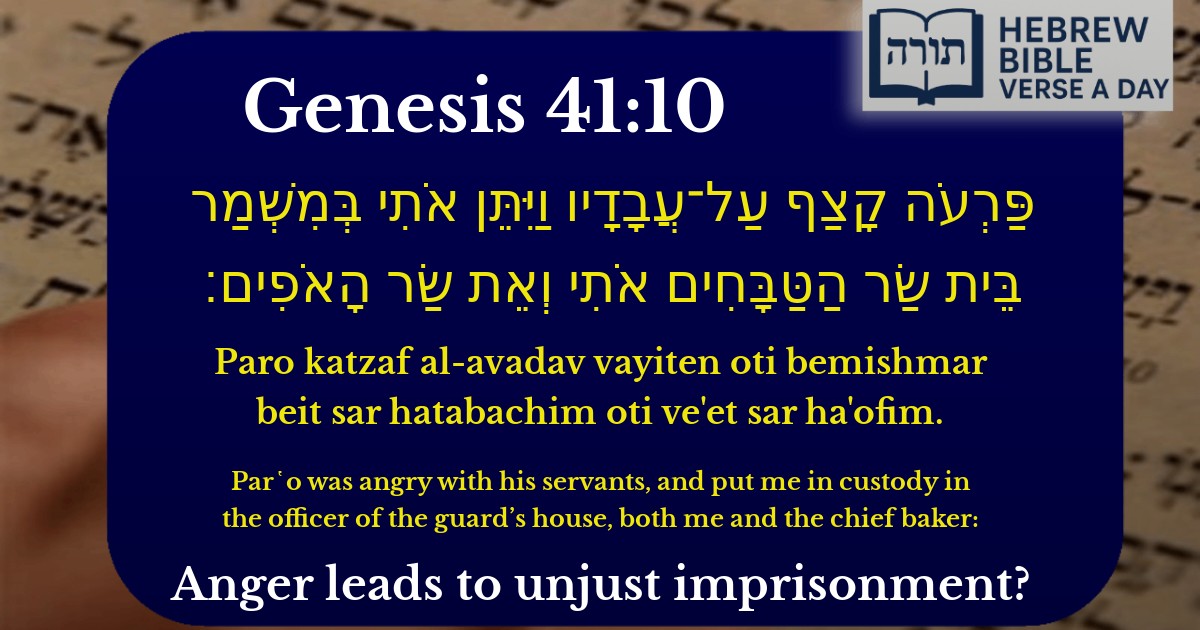Join Our Newsletter To Be Informed When New Videos Are Posted
Join the thousands of fellow Studends who rely on our videos to learn how to read the bible in Hebrew for free!
Hebrew Text
פַּרְעֹה קָצַף עַל־עֲבָדָיו וַיִּתֵּן אֹתִי בְּמִשְׁמַר בֵּית שַׂר הַטַּבָּחִים אֹתִי וְאֵת שַׂר הָאֹפִים׃
English Translation
Par῾o was angry with his servants, and put me in custody in the officer of the guard’s house, both me and the chief baker:
Transliteration
Paro katzaf al-avadav vayiten oti bemishmar beit sar hatabachim oti ve'et sar ha'ofim.
Hebrew Leining Text
פַּרְעֹ֖ה קָצַ֣ף עַל־עֲבָדָ֑יו וַיִּתֵּ֨ן אֹתִ֜י בְּמִשְׁמַ֗ר בֵּ֚ית שַׂ֣ר הַטַּבָּחִ֔ים אֹתִ֕י וְאֵ֖ת שַׂ֥ר הָאֹפִֽים׃
פַּרְעֹ֖ה קָצַ֣ף עַל־עֲבָדָ֑יו וַיִּתֵּ֨ן אֹתִ֜י בְּמִשְׁמַ֗ר בֵּ֚ית שַׂ֣ר הַטַּבָּחִ֔ים אֹתִ֕י וְאֵ֖ת שַׂ֥ר הָאֹפִֽים׃
🎵 Listen to leining
Parasha Commentary
📚 Talmud Citations
This verse is quoted in the Talmud.
📖 Berakhot 55a
The verse is referenced in the context of discussing dreams and their interpretations, particularly in relation to Joseph's experiences in Egypt.
📖 Sotah 36b
The verse is mentioned in the discussion of Joseph's imprisonment and his eventual rise to power, highlighting divine providence.


Context in the Narrative
This verse (Bereshit 40:2) appears in the story of Yosef (Joseph) in Egypt, where Pharaoh becomes angry with two of his high-ranking officials—the chief cupbearer (sar hamashkim) and the chief baker (sar ha'ofim). As a result, both are imprisoned in the house of the captain of the guard (beit sar hatabachim), where Yosef is also held. This event sets the stage for Yosef's eventual rise to power in Egypt through his interpretation of their dreams.
Rashi's Commentary
Rashi explains that Pharaoh's anger was directed at both servants for separate reasons:
Rashi further notes that the phrase "בְּמִשְׁמַר בֵּית שַׂר הַטַּבָּחִים" ("in custody in the officer of the guard’s house") refers to Potiphar's house, where Yosef was already imprisoned. This suggests that Yosef was given authority over these high-ranking prisoners, as hinted in Bereshit 39:22-23.
Midrashic Insights
The Midrash (Bereshit Rabbah 88:2) elaborates on the nature of their offenses:
The Midrash also connects this event to divine providence, as their imprisonment leads to Yosef's eventual meeting with Pharaoh and his rise to power.
Rambam's Perspective on Divine Justice
Rambam (Hilchot Teshuvah 6:5) discusses how seemingly random events are part of Hashem's hidden guidance. The anger of Pharaoh and the imprisonment of these officials, though appearing as human actions, were orchestrated to fulfill the divine plan of bringing Yosef to a position where he could save his family and the future of Bnei Yisrael.
Symbolism in Their Roles
Some commentators note that the roles of the two officials—cupbearer (associated with wine, a symbol of joy) and baker (associated with bread, a symbol of sustenance)—represent different aspects of royal service. Their downfall underscores the precariousness of human favor and the importance of diligence in serving authority, a theme later echoed in Yosef's own rise and fall in Pharaoh's court.